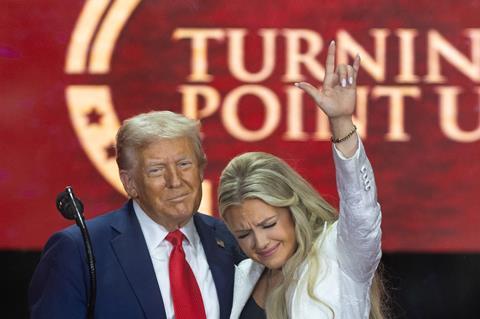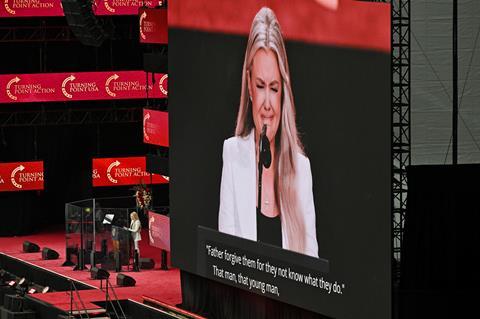Part charismatic-evangelical state funeral, part MAGA political rally, the Charlie Kirk memorial service featured overt and clear explanations of the Gospel. It may even mark a turning point on Donald Trump’s spiritual journey, says Rev Peter Ould

On Sunday evening, with millions of others across the world, I sat down to watch the Charlie Kirk memorial service at the State Farm Stadium in Glendale, Arizona.
I wasn’t quite sure what to expect, but by the end I was convinced I’d just watched something very significant happen.
Part charismatic-evangelical state funeral, part MAGA political rally, this was a unique event that will very likely have significant impact in American politics and beyond for the next few years.
Here are three observations which I believe Christians need to grapple with in the aftermath.
First – It’s vitally important to understand culture and disentangle it from the Gospel.
I used to work for a large US-based firm, and popped over to America a few times a year, especially for our annual sales conferences. These events were so alien to us English employees; we’re far more used to a cup of tea and a hobnob when we get together, but for our American colleagues, nothing short of a High School pep rally would do. It really was a culture shock for us to be sat together with a thousand other employees and have stirring speeches on how we were all going to help MathCo break the 1 billion dollar revenue barrier. It certainly wasn’t how we do it back in Blighty.
It would be a mistake to be distracted by the methods used at the Charlie Kirk memorial event. Yes, it might be alien to outsiders, but this is how they do it in the US. Big, brash emotions - not just on your sleeve but plastered all over your trucker hat.
To the more reserved it might feel shallow and superficial, but it’s just how Americans express themselves. We often talk about cross-cultural mission, understanding and interpretation, thinking about communicating the Gospel half way round the world to post-colonial environments, but these principles apply to the US as well. Patriotic Americans, are loud, obvious and bold, but that doesn’t mean they’re not deep, meaningful and profound at the same time.

Because, second, let’s be very clear, what was being said was profound. Speaker after speaker clearly articulated the Gospel and did so with the conviction of men and women who not only understood theologically what they were seeing, but had eyes and hearts that burned of having been transformed by it and wanting others to experience the same.
If you just read the mainstream media reports you’d have missed this, because it’s much easier to report what you understand culturally if you’re a politics journalist sent to an apparently political event, but in fact this was primarily a religious gathering, even if dressed in MAGA clothing.
Dr Ben Carson, Marco Rubio, RFK Jr and Vice-President Vance all shared their faith. Tucker Carlson managed to rein in his fringe politics with a brief exposition, but his retelling of the events around how the intended death of Jesus was actually the means for God’s work to be done owed slightly more to Jesus Christ Superstar than the Gospel of John. Donald Trump Jr was a revelation – possibly the clearest explanation of substitutionary atonement of the evening. To have Cabinet member after Cabinet member express their faith and trust in their Lord Jesus Christ, and to show that they truly understood what that meant for them personally, was a humbling thing. Oh that we would have similar bold politicians here!
The stand out Gospel moment though was when Erika Kirk said “I forgive him”, referring to the assassin who shot dead her husband at the young age of 31. Through tears she articulated how since the death of Jesus was the source of the forgiveness of her sins, so we should all understand the depths of grace and extend that to the man who had made her children fatherless. It was beautiful, reminding me of CS Lewis’ famous truism – “To be a Christian is to forgive the inexcusable, because God has forgiven the inexcusable in you.”
Third – the Gospel is transformative. As Pete Hegseth was saying “Well done, good and faithful servant” on the stage, the cameras turned away and showed us Elon Musk and Donald Trump sat in a box and reconciling. Nothing short of something like the death of Charlie Kirk could have made that happen, and nothing short of the death of Jesus is what’s needed to reconcile God to man.
That said, when Donald Trump took to the stage it was clear from his speech that he didn’t share the same faith as many of his colleagues, but it was also clear that something had shifted in him, if only in understanding.
The Trump of five years ago wasn’t averse to using federal troops to clear protestors off streets so he could march for a photo-op in front of a church he’d just tear-gassed, holding aloft a Bible. The Trump of this weekend however, while saying he hated his opponent and didn’t want the best for them, recognised publicly that that position was a far cry from the cross-focussed, persecutor-loving forgiveness that Erika Kirk had shown just minutes before.
I thought that was a rather significant moment. Trump appears to have moved from someone who doesn’t understand what the Gospel is, to someone who recognises what Christianity teaches about forgiveness of sin and the need for repentance, but finds the cost too much to pay at the moment. It’s almost as though he knows now that to become a Christian is to die to self, he’s just not ready for that sacrifice.
And I wonder if he’s moved to that point because increasingly over the past five years he has been surrounded by men and women whose loyalty is primarily to Jesus Christ, not Donald Trump. Charlie Kirk may have been a massive MAGA advocate, but he repeatedly called his listeners to push country and party way down the list of priorities, below first God and then family.
So yes, you could have watched Trump yesterday, listened to his normal “how many rabbit-holes can I go down” style of rhetoric, and thought same old, same old, but in amongst all of that I believe was clear evidence that when you hang around true believers, you begin to realise what true belief actually is, and means.
And I think that’s a challenge, because I wonder what a saved Donald Trump would actually be like? Would he change his politics? If he didn’t change his politics, but changed his saviour from his ego to Jesus, would I be happy for him? Do I want to be with Donald Trump in the new creation? Do I want to be with Charlie Kirk’s murderer in the new creation? Do I really believe that “the vilest offender who truly believes, that moment from Jesus a pardon receives”? Will I pray for people’s salvation not on the basis that God makes them more like a person who conforms to my politics, but simply that he would forgive them of their sin, and bring spiritual healing in their lives?
Sunday’s service challenges us all. It challenges us to think whether we would be as bold to proclaim our trust in Jesus our saviour, and what impact that might have on those around us. And it challenges us as to who we think the Gospel is for – if anything, the main point of the night was that the Gospel is for people like the man who murdered Charlie Kirk, and it’s for people who don’t think it’s for people like the man who murdered Charlie Kirk.



































7 Readers' comments